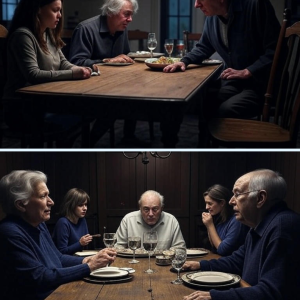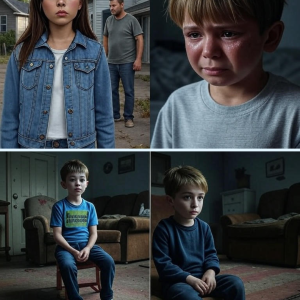The soft glow of Christmas lights and the warmth of roasted turkey may evoke joy for many, but for Ryan—a quiet, determined software developer from Seattle—one particular Christmas dinner unearthed long-buried truths that would forever alter his understanding of family, loyalty, and self-worth. At the heart of this story lies a simple question from his grandfather: “Is the $15,000 I send you every year enough?” What sounded like a casual inquiry cracked open a hidden chapter of betrayal and transformed Ryan’s life.
Ryan’s journey began in a household that thrived on favoritism. Growing up in Bellingham with an older brother, Logan, Ryan quickly learned that charm, appearance, and smooth words won affection—none of which came naturally to him. While Logan was celebrated for his achievements and charisma, Ryan, introverted and awkward, often found himself pushed to the margins. The only consistent pillar of support was his grandfather, Frank, who saw promise in Ryan’s quiet love for computers and encouraged him when others dismissed him.
This intergenerational bond reached a breaking point when Ryan turned eighteen and received a partial scholarship to the University of Washington. Elated, he shared the news with his parents—only to be told that they had already spent their savings on Logan’s education. Ryan was advised to take out student loans because, in their eyes, Logan had “more potential.” It was a wound compounded by his mother’s cruel comment: “You sit at your computer all the time.”

Heartbroken, Ryan turned to Grandpa Frank, who promised to support him financially—$15,000 per year for four years. However, a month later, Ryan’s father claimed that Frank had changed his mind due to “financial difficulties.” Feeling deeply betrayed, Ryan believed this version of events and began pulling away from his grandfather. For over two years, he ignored calls, skipped family gatherings, and buried his grief and confusion beneath a mountain of student debt and part-time jobs.
The pain didn’t stop with Frank. Ryan’s parents continued to support Logan even after college—buying him a car, contributing to a luxury apartment, and helping fund vacations—while Ryan struggled alone. Despite being a full-time student, he worked long shifts at Starbucks and delivery gigs to make ends meet. The few conversations with his parents were cold and infrequent. His heart grew heavy with loneliness, particularly during holiday breaks when friends returned to warm, welcoming homes while he remained behind, working and surviving.
This emotional isolation lasted until Christmas 2021, when Frank finally sent a message through Ryan’s Uncle Dennis, who arrived unannounced at the Starbucks where Ryan worked. Dennis’s words were direct: “Grandpa knows you’ve been avoiding him for the past two years. He’s out of patience.” Hearing that his grandfather had known all along—and had remained patient, even gentle—shook Ryan deeply. Told that it might be Frank’s last Christmas hosting the family, Ryan made a snap decision to go home.
What awaited him at the family gathering was not confrontation but quiet affirmation. Frank welcomed him with a warm, forgiving smile and the simple words: “Welcome home.” Despite lingering tension, Ryan began to realize that he may have misjudged the one person who had always believed in him.
Then came the moment that shattered the false reality he had been living in. While seated at the dinner table, surrounded by relatives and polite small talk, Frank asked: “Is the $15,000 I send you every year enough?” The question was casual, almost absentminded—but it hit Ryan like lightning. In that instant, he understood the full depth of his parents’ betrayal. Frank had never withdrawn his offer. The money had been sent—through his parents, as agreed—and they had kept it. Lied about it. Used it for their own benefit while letting their youngest son struggle and resent the very man trying to help him.
This moment wasn’t just about money. It was about deception, favoritism, and stolen trust. For years, Ryan had punished the wrong person. He had turned his back on the only family member who truly supported him because of a lie carefully constructed by his parents. In that split second, years of confusion, guilt, and pain made sense.
Ryan’s story is not just a narrative of family dysfunction—it is a powerful exploration of truth, perception, and the long-term damage of favoritism. His experience exposes how silence and manipulation can fracture relationships and leave lasting scars. It also offers a profound reminder: The people who love us quietly, without conditions or spectacle, are often the ones we ignore until it’s nearly too late.
In the end, Ryan not only rediscovered his bond with his grandfather, but also reclaimed his voice. That Christmas did not just reveal a hidden financial betrayal—it marked the moment he saw his own worth clearly for the first time. It was the beginning of emotional healing and, perhaps most importantly, a powerful reckoning with what—and who—truly mattered.





